Objects Κέντρον Ερεύνης Ελληνικής Φιλοσοφίας
<< 10
10 >>
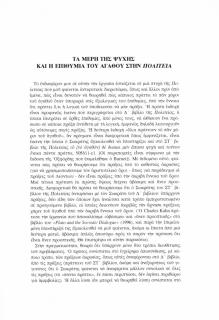
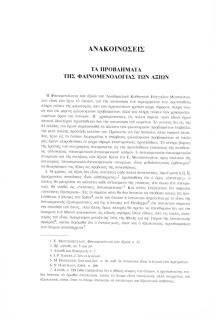
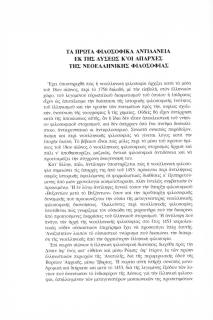
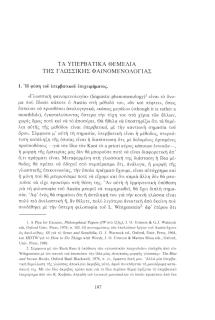
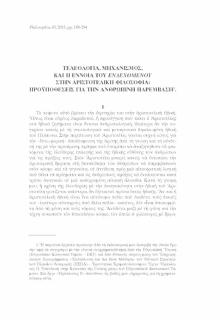
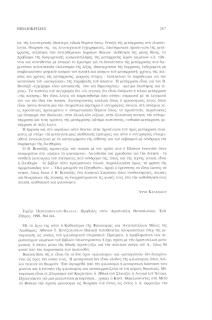
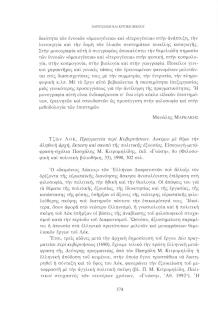
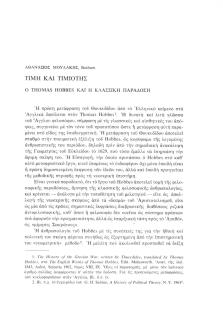
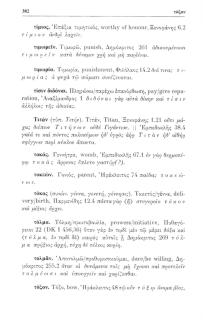
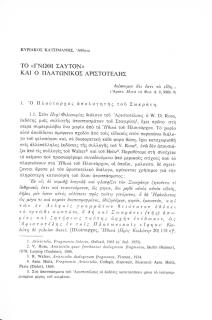
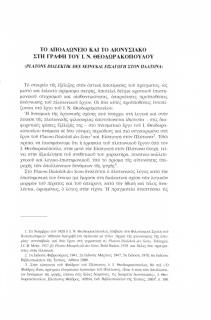
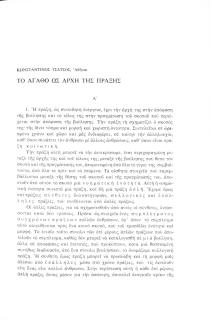 << 10
10 >>
<< 10
10 >>
Total: 4244

Τα μέρη της ψυχής και η επιθυμία του αγαθού στην Πολιτεία
Ενότητα: Άρθρα του περιοδικού "Φιλοσοφία"
In the Lysis, in the Symposium, apparently in the Republic, and less conspicuously elsewhere, Socrates - or in the case of the Symposium, (what I take to be) his spokeswoman Diotima - commits himself to the view that all desire is for the good. The question addressed by my paper will be what exactly he means by this, and whether he means the same thing on all occasions. My claim will be that he means one thing in the Lysis and the Symposium, and another quite different thing in the Republic. In the first two of these dialogues, h means exactly what he says: all our desires, always, are directed towards the real good. In the Republic, by contrast, he introduces - in Book IV - some desires that he specifically says are not directed towards the good; I claim that he cannot, then, mean what he appears to say in Book VI, when he describes the good as that «which every soul pursues, and does everything for the sake of this...» (505 d 11- e 1). So what does he mean, and why does it matter? In fact, I suggest, the two passages in the Republic repr...
Τα προβλήματα της φαινομενολογίας των αξιών
Ενότητα: Άρθρα του περιοδικού "Φιλοσοφία"
Δεν υπάρχει περιγραφή
Τα πρώτα φιλοσοφικά αντιδάνεια εκ της Δύσεως και οι απαρχές της Νεοελληνικής Φιλοσοφίας
Ενότητα: Άρθρα του περιοδικού "Φιλοσοφία"
Δεν υπάρχει περιγραφή
Τα υπερβατικά θεμέλια της γλωσσικής φαινομενολογίας
Ενότητα: Άρθρα του περιοδικού "Φιλοσοφία"
«Linguistic Phenomenology» is the name Austin once gave his method. I argue that the structure of this method is transcendental, in the way Kant understands this term (or, rather, the way Austin says that Kant understands it.— «Are There A Priori Concepts?»). What, according to this definition, is peculiar to a transcendental approach is its persistence on well tried and commonly accepted practices and its correlative distrust towards attempts at changing them fundamentally. «If the criticisms leveled against such practices were justified», the transcendentalist points out, «then we would not be able to do what we do in fact do». This is as true of Austin as it is of Kant. Regarding Kant, this is revealed in his reaction to the Humean analysis of causality. If Hume were right about causality (and the nature of our experience as a whole), Kant relfects, then we would not be able to do the very thing we have already been doing for so long and with such success, namely create exact physical sciences of predictive and explanatory content. (A...
Τελεολογία, Μηχανισμός, και η έννοια του ενδεχομένου στην αριστοτελική φιλοσοφία: Προϋποθέσεις για την ανθρώπινη παρέμβαση
Ενότητα: Άρθρα του περιοδικού "Φιλοσοφία"
The aim of this paper is to propose a method for approaching the aristotelian ethical principle of the human intervention on the world through the connection of concepts such as causality, teleology, necessity and chance outside ethics. My point of view is holistic, in that it is grounded on various works of Aristotle, insisting on Physics and On Interpretation. The physical framework emphasizes on the superior position of teleology which coexists with necessity and chance as well. On the other hand, the semasiological examination of the future statements proves that the logical necessity and the predetermination of many future facts should be abandoned for the sake of human deliberation and action. The contingent is the condition under which human agents can deliberate, choose, act and change the flow of things. People can decide about facts, because facts are not predetermined. The only «pre-determination» both of natural processes and of human actions is the teleological one, in that everything is necessarily characterized by the perspe...
Τερέζα Πεντζοπούλου-Βαλαλά, Προβολές στον Αριστοτέλη, Θεσσαλονίκη, Εκδ. Ζήτρος, 1998, 364 σελ.
Ενότητα: Άρθρα του περιοδικού "Φιλοσοφία"
Δεν υπάρχει περιγραφή
Τζων Λοκ, Πραγματεία περί Κυβερνήσεων. Δοκίμιο με θέμα την αληθινή αρχή, έκταση και σκοπό της πολιτικής εξουσίας. Εισαγωγή - μετάφραση - σχόλια Πασχάλης Μ. Κιτρομηλίδης, εκδ. «Γνώση», 8ο (Φιλοσοφική και πολιτική βιβλιοθήκη, 33), 1990, 302 σελ.
Ενότητα: Άρθρα του περιοδικού "Φιλοσοφία"
Δεν υπάρχει περιγραφή
Τιμή και τιμιότης. Ο Thomas Hobbes και η κλασσική παράδοση
Ενότητα: Άρθρα του περιοδικού "Φιλοσοφία"
A close study of Hobbes introduction to his translation of Thucydides confirms the view that fundamental aspects of Hobbes anthropology antedate his adoption of the «geometric method». The «humanist» appeal to an ancient authority barely conceals his anticlassical, one may say antiphilosophical, bias. Depending on their «degree» or social standing Hobbes assigns men specific degrees of «virtue». What «honour» is to the few and excellent, «honesty» is to the multitude. Though social cohesion depends on the latter it is the former that ultimately safeguards society. Thus, the exercise of the lower mode of «virtue» Is dependent upon its higher counterpart. Hobbes accordingly delineates in the introduction to Thucydides a paedagogic goal that in effect replaces the classical imitation of Socrates by the imitation of William Cavendish, Earl of Devonshire
Τιτάν
Ενότητα: Λεξικό Προσωκρατικής Φιλοσοφίας
Τιτάν
Το «γνώθι σαυτόν» και ο πλατωνικός Αριστοτέλης
Ενότητα: Άρθρα του περιοδικού "Φιλοσοφία"
Le premier fragment du dialogue aristotélichen Περί Φιλοσοφίας, dans l’édition de W.D. Ross Aristotelis fragmentia selecta, est un cas typique de texte qui, sans être suspect, ne fournit pas une preuve irréfutable en faveur de son authenticité et de son attribution à telle œuvre perdue du philosophe. Or, malgré les sérieuses réserves dues à la brièveté du fragment, au sujet vague dont il traite et aux conditions dans lesquelles il nous a été transmis par Plutarque, nous inclinons à adopter, après l’avoir méthodiquement examiné, les conclusions suivantes : 1. Le fragment dont il s’agit serait le résultat d’une fusion de deux textes : le texte pp. 229e-230a du Phèdre et celui p. 24b de l’Apologie de Platon; en juxtaposant le premier fragment du Περί Φιλοσοφίας et le témoignage de l’Apologie concernant l’embarras de Socrate à la suite de l’oracle rendu à Chéréphon, l’on relève des ressemblances allant jusqu’au vocabulaire. 2. Nous serions porté à attribuer la fusion précitée à Aristote lui-même, en pensant qu’il aurait légèrement infléchi ...
Το Απολλώνειο και το Διονυσιακό στη γραφή του Ι.Ν. Θεοδωρακόπουλου (Platons Dialektik des seins και εισαγωγή στον Πλάτωνα)
Ενότητα: Άρθρα του περιοδικού "Φιλοσοφία"
Δεν υπάρχει περιγραφή

